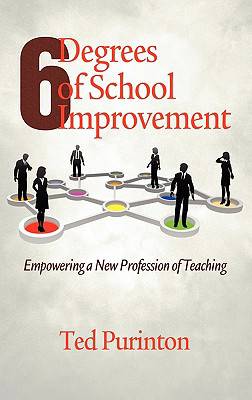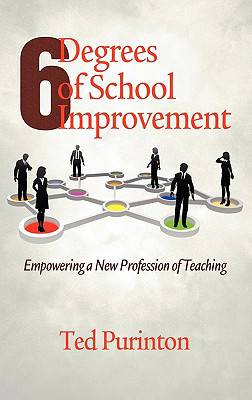
- Afhalen na 1 uur in een winkel met voorraad
- In januari gratis thuislevering in België
- Ruim aanbod met 7 miljoen producten
- Afhalen na 1 uur in een winkel met voorraad
- In januari gratis thuislevering in België
- Ruim aanbod met 7 miljoen producten
Six Degrees of School Improvement
Empowering a New Profession of Teaching (Hc)
Ted PurintonOmschrijving
Amidst the contentious debates about teacher effectiveness, most people believe that unions, education colleges, charter networks, consulting agencies, textbook publishers, test producers, professional associations, teachers, and researchers disagree with one another about the most essential school reforms. Though all these groups do certainly have their own interests and perspectives, they also all desire to see that students are better prepared for a competitive world. What if all these groups worked together for that very goal? What would happen if all reform work in PK-12 education centered on the improvement of teaching? Would teachers be treated differently? Would they respond to their work in more innovative ways? Would it change the quality of education that children in the United States receive?
Six Degrees of School Improvement: Empowering a New Profession of Teaching provides glimpses of this realistic approach to American education reform with an eye toward what the system might look like in one to two generations from now. The book makes a solid case for "collaborative professionalism," a system that binds professionals together under a common set of understandings about the ways in which children and adolescents learn content knowledge and acquire skills. It argues that popular approaches to school improvement circumvent teachers and thus further de-skill and disempower the very people responsible for student learning in classrooms. Most importantly, the book provides very clear guidance on building a system of collaborative professionalism among teachers.
Specificaties
Betrokkenen
- Auteur(s):
- Uitgeverij:
Inhoud
- Aantal bladzijden:
- 290
- Taal:
- Engels
Eigenschappen
- Productcode (EAN):
- 9781617353673
- Verschijningsdatum:
- 4/02/2011
- Uitvoering:
- Hardcover
- Formaat:
- Genaaid
- Afmetingen:
- 156 mm x 234 mm
- Gewicht:
- 580 g

Alleen bij Standaard Boekhandel
Beoordelingen
We publiceren alleen reviews die voldoen aan de voorwaarden voor reviews. Bekijk onze voorwaarden voor reviews.









